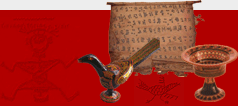| 您的位置:首页 --> 与会学者 --> 论文提要 |
国际彝学研究中的跨语际实践:维系口头传统活力与文化迻译中的关键词问题
On the Trans-lingual Practice in International Scholarship of
Yi Studies:
Revitalizing Oral Tradition and Problematic Keywords in Cultural
Translation
巴莫曲布嫫 Bamo Qubumo
中国社会科学院民族文学研究所
【摘要】本项研究导源于笔者和一位美国人类学家之间曾经发生的一场激烈争论。术语问题已然成为百年国际彝学对话的一个关捩点,其间的一个突出现象就是:人类学者与民俗学者之间长期形成的一种隔膜,实际上已经成为横亘在这两个学科之间一道学术壁垒。这两个学科在关注无形文化方面有着共通的视域,对口头传统的研究都有着长久的学术史,二者大都以田野调查为技术路线,注重民间口传基本素材的记录、观察、描述、采集与分析,也就是口承文化本体的研究。但二者却沿着各自独特的研究方向发展,相互之间缺少学理性的对话与呼应,往往在口头文类界定与术语表述方面自说自话,带有强烈的学科本位主义色彩。例如,人类学者与民俗学者在相关的文化迻译过程中都无疑会大量引述各种“族群叙事”与“表达传统”,但在口头文类的界定、基本概念的定义,以及本土口头传承的文化阐释上则各自为阵,无一定律,甚至无视地方知识体系中的话语范畴、初始语义、传统指涉性与价值认同,因而错误地传达了基本的文化信息,尤其是鲜有学者仔细地关注口头文本的制作、口头文类的准确界定,在涉及本土口头传统领域时也没有建立“以表演为中心”的文本阐释观,因而导致了学术研究中概念的模糊,术语的误用,文本的误读。因此,怎样在相关的学术表述与文化迻译中,打通这一道无形的“墙”,则是本文写作的基本出发点。作者以诺苏彝族的口头论辩“克智”为个案,从彝、汉、英语三种语言的表述及其操作方法,去思考那些在学术写作中容易导致对彝族口头传统产生误读或误解的“关键词”或核心术语,进而讨论国际彝学研究中的跨语际实践和文化迻译问题,并呼吁编制一本彝汉英关键词手册,以推进相关学术的国际对话。
关键词: 口头传统 学术表述 地方知识 传统指涉性 跨语际实践 文化迻译 关键词
Abstract
The present proposal derived from a “battle” between an American
anthropologist and the author, and that has been a very valuable
cue to me, pondering over such a problematic issue on keywords
led to misreading and misunderstanding of oral tradition in international
Yi Studies, since the same question emerged from behind the presentations
or writings among other anthropologists and folklorists who have
had engagements with Yi Studies. Cultural translation has long
been recognized as an issue in anthropology as it is practiced
in the U.S. and the U.K (Ann Hill 2001); the Chinese folkloristic
tradition is equally complex. The striking fact about cultural
diversity of Yi ethnic group and its subgroups inhabiting in southwest
China is that there are so many of intangible culture taking shape
of oral traditions, indigenous oral genres, ways of speaking,
or cultural expression still alive, often almost unknown to outside
dominant Han Chinese culture and undocumented in a strict format
in terms of folkloristic framework, and most of them certainly
in danger of extinction. In scholarly writings or representations,
as a part of international discourses in Yi Studies, a type of
trilingual-translating has made up of an exchange arena unfolding
a variety of different consciousnesses, including political, academic,
national, ethnic and individual consciousness, where framing a
legitimate space for individual scholar and local communities
to express their ideas, perceptions or desires in the process
of interpreting folklore and oral tradition. But unfortunately,
so far few scholars have given serious attention to these critical
questions resulted in misreading of native oral traditions, and
failed to comprehensive understanding of the complex phenomenon
of cultural translating, which was organized by the government
agencies or carried out by research enterprise and scholars. As
the problematic situation shows the long standing issues and possible
strategies for preserving and revitalizing the multiplicity and
implications of ethnic oral traditions and verbal arts among the
Yi people and beyond, we become more aware of such a fact: there
has been a “wall” between anthropologists and folklorists, between
emic and etic studies, between outsiders and insiders, and between
here and there in finding an appropriate expression of oral traditional
knowledge and folk memories. Consequently, the present presentation
primarily focuses on common trends and core issues in responding
to the emergent discourses in internationalized Yi studies. Based
upon a folkloristic field study on Nuosu Yi’s kenre, a kind of
the ritualistic flyting or verbal-dueling throughout the Great
Cold Mountains, which is recognized for the first time as a key
device for carrying out hnewo epic performance, the author is
to embark, in a preliminary way through selecting keywords from
local knowledge, traditional referentiality, and native terminology,
on the consideration of how some dimensions of Yi’s oral genres
and local conceptions have been represented in the Chinese and
English literature. Differences of cultures and academic traditions
lead to some tangled problems in basic concepts and terms. The
author evokes seriously, scholars should take definition and identification
as the very first step for safeguarding intangible cultural heritage
and revitalizing oral traidtions. That's why she claims for another
epistemological approach to do trilingual-practice (Yi/Chinese/English)
in cultural translation in light of Nuosu oral traditional laws
and conceptions in native contexts. It is time to advocate claims
for compiling a trilingual reference glossary with internationalized
standard for defining a basic set of words and terms we use everyday,
we think with them, we rest our scholarship on them, we teach
with them, in doing so to overcome some obstacles in international
discourses of Yi Studies.
Keywords: oral tradition─academic representation─local knowledge─traditional
referentiality─trans-lingual practice─cultural translation─keywords
作者简介:
巴莫曲布嫫,女,彝族,1964年出生于四川凉山昭觉。1984年毕业于中央民族学院汉语言文学系;1988年7月毕业于中国社会科学院研究生院文史哲部,获法学硕士学位(民族学);2000年9月~2002年1月哈佛大学文理学院访问博士研究生;2003年7月毕业于北京师范大学文学院民俗学专业,获法学博士学位(民俗学)。现任职于中国社会科学院民族文学研究所,研究员,民族文学理论室主任,口头传统研究中心执行主任;中国社会科学院研究生院教授、硕士导师;中国社会科学院青年人文社会科学研究中心理事。此外,兼任中山大学中国非物质文化遗产研究中心研究员、首都师范大学中国诗歌研究中心研究员、美姑中国彝族毕摩文化研究中心特聘研究员,巴莫姊妹彝学小组常务理事;中国民俗学会常务理事,副秘书长;国际民俗学者组织(FF)通讯会员;中央国家机关青联委员。在治学方法上长期坚持实地田野调查与彝文文献考察相结合,业已形成的学术方向是彝族经籍文学与民俗文化,口头传统与书写传统;个人教学领域是西南少数民族口头传统研究。迄今已出版个人学术专著《鹰灵与诗魂——彝族古代经籍诗学研究》(2000年),田野图文报告《神图与鬼板——凉山彝族祝咒文学与宗教绘画考察》(2004年);在《文学评论》、《民族文学研究》、《民族艺术》、《民俗研究》、《口头传统》(美)、《亚洲族群》(英)、《日中文化比较研究》(日)、《比较民俗学》(日)等刊物上发表论文、调查报告80余篇;参与编撰的学术著作有《彝族文化史》、《彝族风俗志》、《中华文学通史》(〈古代文学卷〉编委)、《中国少数民族文化史》、Mountain
Patterns: The Survival of Nuosu Culture in China等。目前正致力于“口头论辩与史诗演述──彝族民间叙事传统研究”(国家社科基金项目)的田野研究。
About the Author:
Bamo Qubumo (Bamo Qubbumo) comes from Nuosu Yi, born in the
Cold Mountains, Sichuan; received her M.A. in Tibetan-Burman Language
and Literature from The Graduate School of Chinese Academy of
Social Sciences (GSCASS) in 1988, obtained her Ph. D. in folklore
at Beijing Normal University in 2003. Her research focuses on
the tie between written and oral traditions of the Yi. She has
conducted long-term field study on various aspects of Bimo scripture
culture and Yi oral narratives. She is senior researcher and Director
of Division of Literary Theory and Criticism, as well as Executive
Director of Oral Traditions Research Center at Institute of Ethnic
Literature (IEL), Chinese Academy of Social Sciences (CASS). She
also acts as Deputy General-Secretary of China Folklore Society
(CFS). She is author of The Golden-Eagle Spirit and the Poetic
Soul: a Study on Yi Ancient Scripture Poetics (2000), Spirit Picture
and Ghost Board:A Survey of Incantation Epos and Ritualized Paintings
in Nuosu Yi Area (2004), coauthor of The History of Yi Culture
(1990), Mountain Patterns: the Survival of Nuosu Culture in China
(2000). She currently has her target field study underway on Yi’s
verbal dueling and epic tradition.
|





